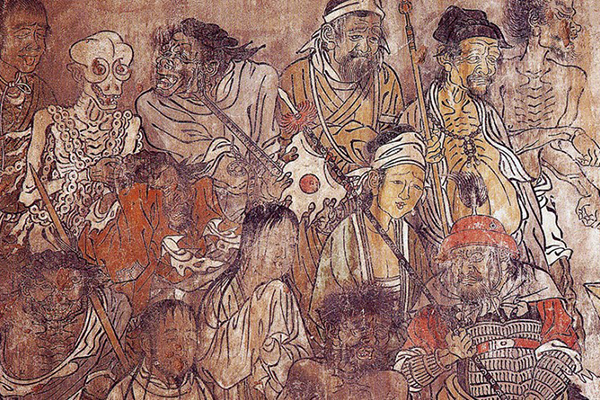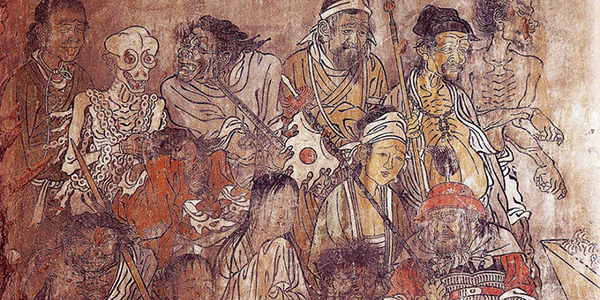
The cliché goes, “Hindsight is 20-20.”
In one of those brief moments where I get to think for myself, I sometimes rue my focus in university, not realizing the full extent of what I could have done with my archaeology undergrad.
You see, if I could go back with what I know now, and investigate what I thoroughly enjoy, I’d focus more on the social anthropology and try to find the answers to my own questions on the supernatural.
For starters, why are ghosts such a prominent fixture in our culture? Since the Epic of Gilgamesh (2,700 BCE), the ghost has been just that. And it’s not specific to one culture. The Sumerians clearly believed in the afterlife, and we still see it in our faiths and latent fascination come Halloween.
If I were to take my knowledge that I have now, of the inner workings and usefulness of university, I would have gone full bore into social anthropology and focus my efforts on finding the common denominator among cultures: the ghost.
Whether it be the vengeful spirit of Victorian lore, or the present threats to morality, demons, they all need to be legitimately investigated.
Alas, it’s just not mainstream enough to be taken seriously.
Sure, atheists and skeptics can balk that there is no evidence to say that ghosts exist. Richard Dawkins made damn sure to bemoan anything remotely supernatural. But is there anything that says otherwise? Not really. As Michio Kaku brushes on physics theories of parallel universes, could these not be implemented to explain some supernatural events. It’s been briefly touched in pop culture, Interstellar, being a loose explanation for some spectral phenomenon.
Why don’t legitimate scientists actually pick up the PKE meters and do the heavy lifting for a change, if reality TV shows exist as mere fodder for the masses? (The spirit of sarcasm was invoked in that last sentence).
When something’s supernatural, there’s bound to be an explanation for it. But what if, in our arrogance, we just haven’t found a reason behind it. In my experience, there are some hauntings that are just historical repeaters. Someone re-enacting what they did in life. For example, the great battlefields of Passchendaele, Stalingrad and Gettysburg all have spooky happenings. When that much energy is expelled in a particular spot, there’s bound to be something left behind.
I find culture, when it comes to a belief in the afterlife, fascinating. I’ve been drawn to the paranormal because of my own experience. I’ve always wanted to uncover the common bonds between cultures.
As a journalist, a lot of the evidence collected in stories is as much anecdotal as it is factual. We’re balanced when it comes to reporting features. When it comes to hard news, sure, it’s just the facts, but when it comes to anecdotal evidence, the supernatural does reign supreme.
Often times, those anecdotal claims hurt the own veracity of the supernatural.
“If ghosts are real, and are some sort of as-yet-unknown energy or entity, then their existence will (like all other scientific discoveries) be discovered and verified by scientists through controlled experiments — not by weekend ghost hunters wandering around abandoned houses in the dark late at night with cameras and flashlights.” – Benjamin Radford, Live Science (2017).
Now, there’s a belief in Tibetan mythology, that a tulpa, or thoughtform, is created when enough people believe in something supernatural. With time, a haunting that is common knowledge changes as people share stories. What we may call creepypasta in the digital era, may well have been a tulpa in the past.
From tales of spirituality in the Epic of Gilgamesh to present-day ghost hunters, the phenomenon has been a touchstone of all cultures. Some dread the sight of a ghost, others are fascinated by it. And I’d simply like to study the drivers of the belief in spectral emanations.
I’m not big on admonishing the belief, as I have had my own unexplainable experience, as well as my own run-ins with night terrors. It’s tough for science to explain our dreams in the most tangible way possible, but it’s still easier, right now, to explain them rather than the afterlife.
Investigators like Ed and Lorraine Warren, as well as Zak Bagans and Yvette Fielding don’t necessarily help. But can we at least acknowledge this as a common denominator throughout the ages, and at least dive deeper into what ghosts really are? All we get, as a society, are scientists crapping on it instead of trying to explain experiences without the usual flippant or glib comments.
Then again, I’ve had run-ins with people who take themselves far too seriously and squirrel themselves away in ivory towers to do their work in silence.
Regardless of belief or not, it’s still an amazing social anthropology study. Some professors of sociology pick up the mantle, like David Aveline at Mount Royal College in Calgary, Alta.
In rumblings through the ghost investigation community, he is looking to compile the anecdotal evidence from those who have experienced hauntings. It will be interesting what he uncovers.
The questions: “Why do some people believe in ghosts?” and “What is it about an experience that makes them think they’ve had a brush with the afterlife?” need to be answered. And not with glib, under-the-breath utterances of some contemptible lout.
That’s a story worth sharing, and without the glib remarks of armchair skeptics, jawing from peanut galleries.

